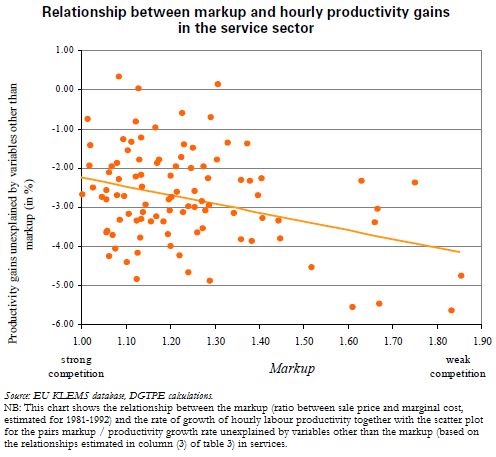Trésor-Economics No. 51 - Competition and productivity gains: a sectoral analysis in the OECD countries
Competition in the markets for goods and services is frequently cited as a contributor to economic growth. That is because greater competition in a given sector is thought to boost activity and jobs by lowering the sale price of goods and raising that sector's productivity, particularly through innovation.
From a theoretical standpoint, however, the impact of competition on productivity is less certain. Fears of losing market share and of not surviving certainly ought to incite firms to innovate, but it is also possible that firms would be unwilling to bear the costs of innovation unless they could reap sufficiently high rents in return.
The econometric results obtained from a sample of 11 OECD countries and around twenty sectors indicate the existence of a non-linear relationship between competition and productivity gains: competition, would promotes productivity gains up to a certain point, but would inhibit them beyond that point.
However, the degree of competition has no material impact on productivity gains when the survey sample contains only the most competitive sectors. Consequently, increased competition would boost productivity in uncompetitive sectors but would have little impact on the most competitive sectors.
Moreover, the impact of competition on productivity gains differs according to the type of sector. In the manufacturing sectors, which are characterised on average by relatively high levels of competition and sunk costs, an intensification of competition would slow the pace of productivity gains. In services, on the other hand, where there are fewer instances of sunk costs and where competition is relatively weak on average, increased competition would always promote productivity gains (see chart below).
